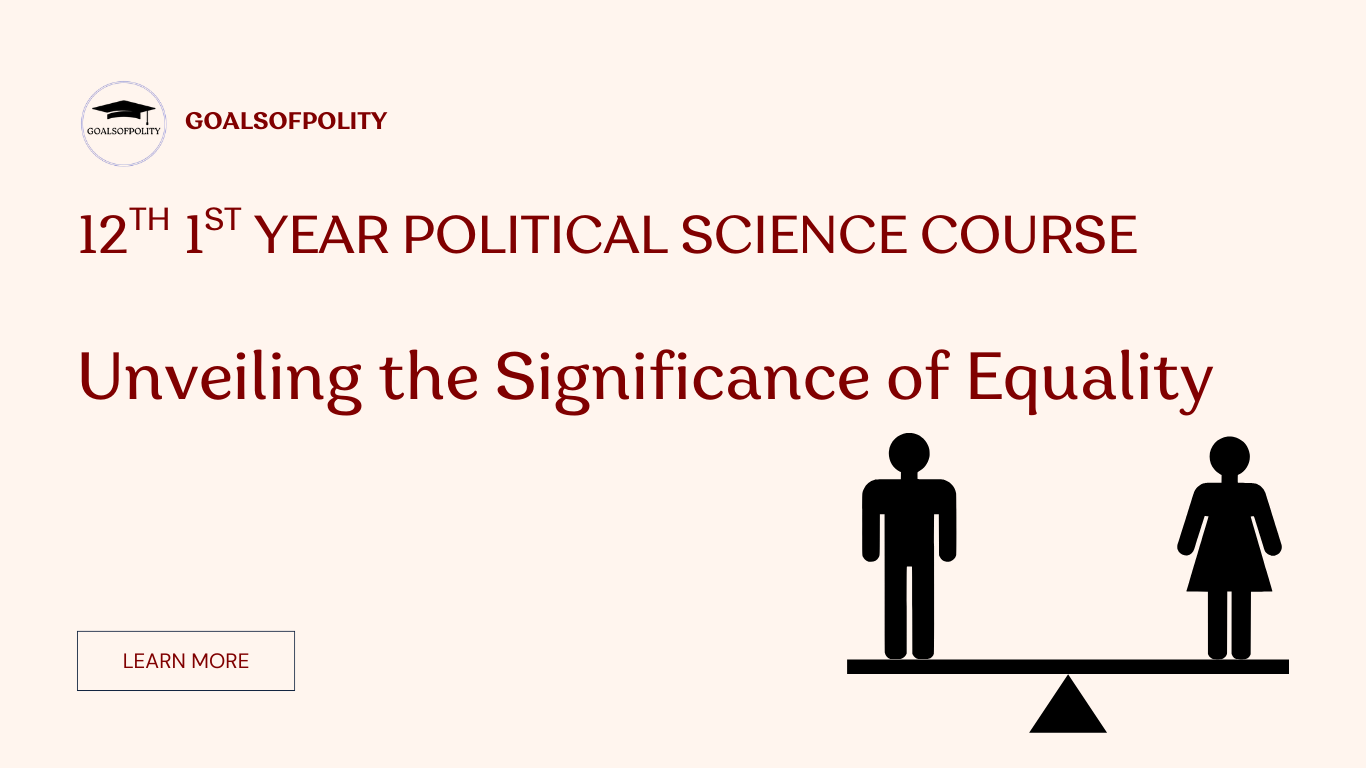Table of Contents
Equality is one of the most fundamental values that shape human life and society. At its core, it means treating every individual with equal respect and dignity, regardless of their background, identity or circumstances. It is based on the belief that all people are entitled to the same opportunities and should not face discrimination due to factors such as gender, caste, class, race, religion or economic status. Equality does not mean that everyone should have the same abilities or achievements; rather, it emphasises fairness in access to rights, responsibilities and opportunities.
Meaning of Equality:
Equality means providing every individual with equal respect, dignity and opportunities in life. It is the idea that no one should be treated as less important or less capable simply because of their gender, caste, religion, race, wealth or social background. Everyone does not have to be the same to be considered equal. People will always have different talents, interests and abilities. Equality ensures that everyone has a fair opportunity to use their abilities and succeed without facing unfair barriers or discrimination.
Importance of Equality:
Establishing equality is essential to build a just and balanced society. When everyone has equal access to education, healthcare, employment and justice, it enables people to reach their full potential. This benefits not just individuals, but the entire community.
For individuals, it builds confidence, dignity and self-esteem. When people know they will be treated fairly, they are more willing to work hard and achieve their dreams.
For society, it reduces discrimination, promotes unity and builds social harmony. In a society where all people are treated equally, there is less chance of division, conflict or exploitation.
For progress, equality ensures that when opportunities are open to all, no talent remains undiscovered, innovation and development increase as contributions come from diverse groups of people.
Without equality, societies face injustice, inequalities in wealth and conflict. Concentrated privilege in the hands of a few creates imbalance, frustration, and unrest. However, with equality, societies become inclusive, peaceful, and forward-looking.
The Foundation of Democracy:
Equality serves as the cornerstone of democratic governance, underpinning the principles of representation and participation. In a truly democratic society, every individual possesses equal rights and opportunities, irrespective of their race, gender, ethnicity, or socioeconomic status. This principle ensures that all voices are heard, and all citizens are treated with dignity and respect, fostering an inclusive and vibrant political environment.
Social Justice and Equity:
Beyond its role in governance, equality is instrumental in advancing social justice and equity. By striving to eliminate discrimination and inequality, societies can work towards creating a more just and equitable world. Policies aimed at ensuring equal access to education, healthcare, employment, and other essential services are essential in narrowing the gap between the privileged and the marginalized, promoting social cohesion and solidarity.
Economic Empowerment:
The significance of equality also holds profound implications for economic empowerment and prosperity. In societies where opportunities are distributed equitably, individuals are more likely to fulfill their potential and contribute meaningfully to economic growth. Policies that promote income equality, fair taxation, and access to financial resources can help create a more inclusive economy, where wealth is not concentrated in the hands of a select few but distributed more evenly among the populace.
Fostering Diversity and Inclusion:
Moreover, equality plays a crucial role in fostering diversity and inclusion within society. Embracing diversity enriches the fabric of society, bringing together individuals from different backgrounds, cultures, and perspectives. By promoting equal rights and opportunities for all, societies can harness the full potential of their diverse populations, driving innovation, creativity, and social progress.
Upholding Human Dignity:
At its essence, the significance of equality lies in its inherent connection to human dignity. By affirming the equal worth and value of every individual, regardless of their inherent characteristics or circumstances, societies uphold the fundamental principles of human rights and dignity. Equality ensures that no person is subjected to discrimination, oppression, or marginalization based on factors beyond their control, safeguarding their inherent dignity and worth.
Conclusion:
In conclusion, equality stands as a fundamental pillar of political science, imbued with profound significance and far-reaching implications. From fostering democratic governance and social justice to promoting economic empowerment and diversity, the importance of equality cannot be overstated. As we navigate the complexities of the modern world, let us reaffirm our commitment to equality, striving to build societies that are just, inclusive, and equitable for all.
FAQs:
1. What is going on with a state in Political Theory?
A state is a political association with a characterized region, population, government, and sovereignty.
2. What are the four fundamental components of a state?
The fundamental components are population, territory, government, and sovereignty.
3. What is the distinction between a country and a state?
A state is a political element with administration and sovereignty, whereas a country is a group of people sharing common culture, language, or history.
4. For what reason power/ sovereignty significant for a state?
Power guarantees a state’s freedom to oversee its inside and outside undertakings without outer obstruction.
5. Could a state at any point exist without an administration?
No, an administration is fundamental for the working of a state, as it directs regulations, implements strategies, and keeps everything under control.

